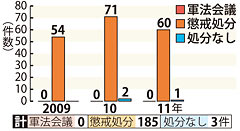Three cases involving military personnel on duty not being subject to punishment

How the Japanese and the U.S. governments processed cases of injury and death involving U.S. service members on duty during the period from 2009 to 2011.
May 24, 2013 Ryukyu Shimpo
Of the 188 cases resulting injury and death involving U.S. service members in Japan that have occurred on duty during the period from 2009 to 2011, three were processed as being not subject to punishment.
While disciplinary action was taken against service members in 185 cases, none were brought before a court-martial.
Nabuo Inada, detective superintendent of the Ministry of Justice, did not give the reasons why these cases were not subject to punishment. He said, “We do not reveal that information in order to protect the reputation of those involved and to maintain our relationship of trust with the U.S. military.”
Although the cases occurred in Japan, those involving U.S. service members on duty were not subject to punishment. The Japanese government gives preferential treatment to U.S. service members because of the U.S.-Japan Status of Forces Agreement. The Ministry of Justice responded to Seiken Akamine of the Japanese Communist Party in the House of Representatives Committee on National Security on May 23.
All of the cases processed as being not subject to punishment involved injuries being inflicted that would take at least four weeks to heal. Two cases occurred in 2010 and one in 2011.
Of the 188 cases, 25 either caused death or injury that take more than four weeks to heal. For those cases disciplinary action was taken against the suspects.
Akamine said, “At the very least, the Japanese government needs to tell us how the cases were ruled as being not subject to punishment.” He went on to say, “The Japanese government has not revealed these reasons, even to the injured parties and bereaved family members.” Akamine suggested that the Japanese and U.S. governments set up some kind of institution to tell the injured parties or relevant municipalities how the cases are processed.
Foreign Minister Fumio Kishida said, “We cannot dismiss the Personal Information Protection Act in the United States, but we would like to consider such cases from the victims’ standpoint.”
The U.S.-Japan Status of Forces Agreement states that the primary jurisdiction over crimes committed by U.S. military service members on duty is determined to be with the United States.
(English translation by T&CT, Mark Ealey)
Pros of buying Viagra online:
Wondering why you should buy Viagra online at all? Okay with your current routine that requires regular visits to your doctor in order to get and renew your prescription? Well, looks like you don’t really know what you’re missing. Read on – there’s more to ordering Viagra over the Internet than meets the eye.
Previous Article:Citizens of Okinawa City guide students from main islands of Japan around Koza
Next Article:Removal of Cold War-era US nuclear base almost complete
[Similar Articles]
- No cases involving military civilian employees “on duty” have been brought before a U.S. court martial in Japan
- Japan has jurisdiction over the fatal traffic accident caused by a U.S. military civilian employee this January.
- [Editorial]
U.S.-Japan Status of Forces Agreement needs to be revised for cases involving civilian employees of the military “on duty” - Off-base drinking ban for U.S. soldiers in Okinawa to be eased
- Japan’s largest legal experts group releases statement about revising SOFA
 Webcam(Kokusai Street)
Webcam(Kokusai Street)


